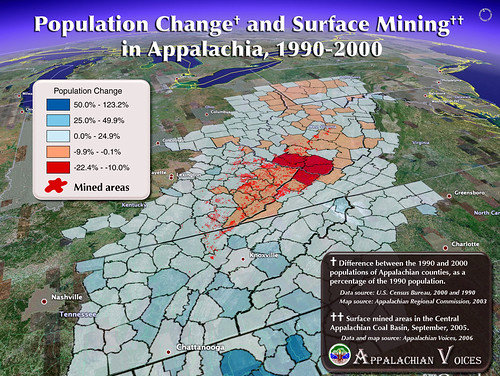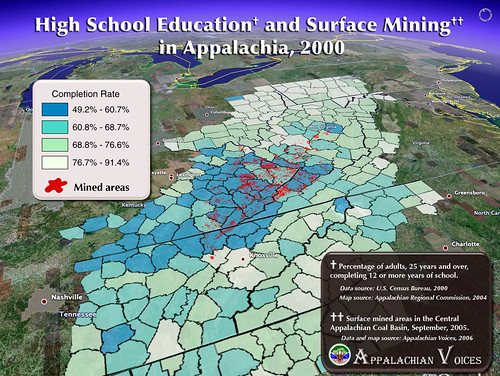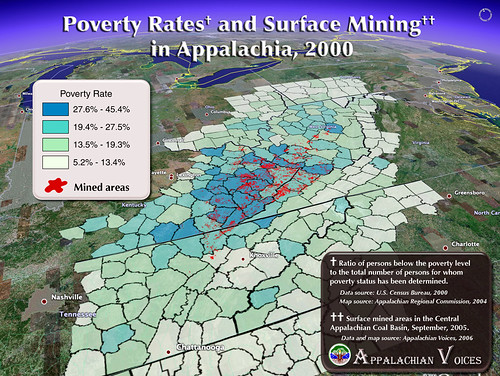 Most of us have seen what mountaintop removal (MTR) does to our beloved mountains and precious headwaters. We’ve heard anecdotes from the people who live there. We’ve even gotten the scoop from our beltway champion, Congressman Pallone on DailyKos the other day.
Most of us have seen what mountaintop removal (MTR) does to our beloved mountains and precious headwaters. We’ve heard anecdotes from the people who live there. We’ve even gotten the scoop from our beltway champion, Congressman Pallone on DailyKos the other day.
Mountaintop removal is devastating to the environment. That much is obvious.
Furthering the discussion, I propose we start our conversation today on jobs and the economy with (as is becoming trademark…) an incredibly articulate chart.

The more we use mountaintop removal, the fewer mining jobs there will be.
Those of us who are fighting for Appalachia, and work daily to stop mountaintop removal are on the right side of the “jobs” argument. There. I said it.
Now hop in!
…
Part I. The Resource Curse
In 1995, Harvard economists Jeffery Sachs and Andrew Warner discovered a clear negative relationship between natural resource-base exports, including agriculture, minerals, and fuels, and GDP growth. Of the 95 countries they investigated, only two achieved a 2% annual GDP growth rate between 1970-1989. A more common occurence was increased poverty, warfare, and civil strife. They dubbed this phenomenon “ The Resource Curse.”
Electric power generation pulled in more than $380 billion in 2005. More than half of that electricity generation came from coal. Coal companies have been here for over 150 years…so why are the people of Appalachia the poorest in the country? Why aren’t we dancing on streets paved with gold? Because, I’ll tell you, coal barons are obsessed with protecting jobs!. They’ll gladly tell you, the most important thing in the world is not clean air, clean water, or healthy communities, but…
1) Jobs
2) Jobs!
3) JOBS!!!
4) air, water, safety, plastic Chinese crap, etc.
Part II: JOBS!!!
Nick Rahall (WV-03) :
Yes coal provides a livelihood to a vast number of people in my district and in West Virginia. Yes, coal is a friend to West Virginia.
Burlington Northern Santa Fe (BNSF) (railroad) CEO Matt Rose:
If an environmental bill is passed [that caps Carbon Dioxide emissions], employment would be cut in half. or more, because coal would be seriously hurt or even eliminated.
Bill Raney, President, WV Coal Foundation:
The state’s coal industry is providing good jobs, while performing quality reclamation. Unfortunately, the industry and its workers “are threatened by these frivolous lawsuits and continued attacks.”…
…Rahall told Raney that his testimony was “right on target.”
In 1999, Senator Robert C. Byrd offered an amendment to allow increased mountaintop removal mining, and weakened laws regarding the dumping of the toxic waste. Several prominent Democrats, including Senators Dodd, and Edwards, and Reid voted for it.
Sen. Byrd:
[this amendment is] to allow for the continuation of our coal industry and the jobs it provides while better protecting the mountains and hollows of the state we love.”
At which point I point them to my favorite graph:

Surface mining (which includes MTR mining), accounts for only 1.2% of jobs in WV and brings in just 2.6% of the state’s total revenues. The counties where surface mining predominates are some of the still poorest counties in the country.

From my favorite book “Big Coal,” by Jeff Goodell:
Today, there are more florists in America than there are coal-miners. And if coal mining were the sure-fire ticket to wealth and prosperity that many in the industry claim, West Virginians would be dancing on gold-paved streets.
…
Over the past 150 years or so, more than 13 billion tons of coal have been carted out of the mountain state. What do West Virginians have to show for it? The lowest median household income in the nation, a literacy rate in the southern coalfields that’s about the same as Kabul’s, and a generation of young people who are abandoning their home state to seek their fortunes elsewhere.
There was a time when coal employed over 150,000 people. Now, in West Virginia, there are less than 15,000 miners.
Part III: Streets of gold
Areas where mountaintop removal and strip-mining take place are near the bottom in every economic indicator. It’s important to note that MTR and strip-mining are not the only factors, but that they are just a part of coal’s century old policy of ignoring and disrespecting the basic American needs of the people in Appalachia.
Coal companies undercut every other industry, and keep the state at the mercy of the 5% severance tax which they provide to the state treasury every year. A cut in the state income would mean cutbacks in services essential to an impoverished people. This is a convenient carrot for Massey Energy to hold out to Appalachian politicians.
Mr. Byrd, Mr. Rahall, Mr. Boucher, please take note.
The Appalachian economy is in shambles, the mountains are being destroyed, the water is being poisoned, and we are at the bottom of the barrel for every economic indicator.
To provide America cheap energy? NO!
The price of Central Appalachian coal has more than doubled in the last decade. It is now the most expensive coal in domestic markets, and states like Virginia (which uses MTR) are importing coal from Indonesia.

For the betterment of Appalachia and its people? NO!
People are literally being driven from coalfields.

This is part of a long-planned and deliberate attempt to remove those pesky “people” from these mountains to get at the resources underneath. If you don’t believe that anyone could do such a thing in the United States of America, a coal-company lawyer H.L. Snyder outlines his “depopulation plan” right here on the internets (.pdf). He’ll say it much more eloquently than I can.
From Jeff Goodell:
Economists don’t offer many easy explanations of why the [resource] curse clings to some countries and not to others, but most would agree that two factors are crucial for success: investment in education, and a transparent political process
In many regions in the coalfields, a High School education is something to brag about.

A motivated but unskilled workforce, and almost complete automation of labor lead to high unemployment and jobs where income is minimal.
We are, therefore, among the most impoverished people in the nation.

Coal has systematically enshrined Appalachian poverty :
A 1983 study of 80 counties in six Appalachian states, including West Virginia, says, “Corporations alone held 70 percent of all mineral rights. Viewed from another angle, 1 percent of the owners controlled 53 percent of the land, a state of affairs that has contributed to the region’s chronic poverty.” Indeed, some of West Virginia’s top coal-mining counties are plagued by chronic poverty. The percentage of people living at or below poverty in Boone County is 18.4. In Logan County, it’s 21 percent, and in Mingo County, 24.7. The state average is 16.3 percent, and nationally it’s 12.5 percent. – Janet Keating
Where does all this coal money go? We should be dancing on streets of gold right?
Hardly.
I encourage you to explore the full list of Big Coal’s favorite recipients in Congress, here.
Other than politicians and coal company CEOs, there are few workers who benefit. We have to face the fact that despite its inverse relationship to job creation, mountaintop removal sites employs people in the coal producing regions of Appalachia. And yet, with mountaintop removal, we then must ask ourselves, How far exactly are we willing to go to “employ” someone? Just because they get a paycheck, does that mean that they can tear down our mountains, poison our water, and destroy our communities? Does that mean we can put the very lives we live in danger?
Part IV: Where do we go from coal?
I have previously explored how to turn a mountaintop removal economy into a sustainable Appalachian wind economy here. If you have a moment, please glance at it and let me know your thoughts.
Tourism already employs far more people in WV than coal does, and should continue to do so as long as we have beautiful mountains. And the recreation/food services industry employs almost twice as many workers as the forestry/mining industry in West Virginia.
The jobs are there. We are on the right side of history and this debate, and we must go green. The future is a green collar economy or bust!
Jeff Goodell:
A full-blown push for clean energy could unleash a jobs bonanza that would make what happened in Silicon Valley in the 1990s look like a bake sale.
A Siegel explores these issues on an almost daily basis, so I highly recommend reading his daily explorations into the exciting wonky world of energy economy.
Part V: Stopping mountaintop removal
As my favorite political cartoonist Bruce Plante illustrates here, mountaintop removal is something that people hate across the political spectrum.

But you can (and must) help.
Congressmen Pallone and Shays have reintroduced the Clean Water Protection Act (HR 2169) as a first step in ending the terrible practice of mountaintop removal coal-mining. As Mr. Pallone announced in his diary here last week, we are now up to 111 bi-partisan co-sponsors. Please call your Congressman and demand that they lift the resource curse of Appalachia, start building a green collar economy here in Appalachia, and co-sponsor the Clean Water Protection Act (HR 2169.)
To see if your Congressman is a co-sponsor, please click here.
If you have already called your Congressman, and want extra credit, please consider calling these key members of the Water Resources Subcommittee, where the HR 2169 will go first.
| Name | District | Local # | D.C. # |
| Eddie Bernice Johnson | TX-30 | (214) 922-8885 | (202) 225-8885 |
| Gene Taylor | MS-4 | (228) 864-7670 | (202 225-5772 |
| Brian Baird | WA-3 | (360) 695-6292 | (202) 225-3536 |
| Jerry Costello | IL-12 | (618) 233-8026 | (202) 225-5661 |
| Russ Carnahan | MO-3 | (314) 962-1523 | (202) 225-2671 |
| John Salazar | CO-3 | (970) 245-7107 | (202) 225-4761 |
| Mazie Hirono | HI-2 | (808) 541-1986 | (202) 225-4906 |
| Harry Mitchell | AZ-5 | (480) 946-2411 | (202) 225-2190 |
| Steve Kagen | WI-8 | (920) 437-1954 | (202) 225-5665 |
| Grace Napolitano | CA-38 | (562) 801-2134 | (202) 225-5256 |
| NY-24 | (315) 252-2777 | (202) 225-3665 |
Arcuri is crossed off because, thanks to the hard work of many folks across the country, on Thursday he became the 110th co-sponsor of the Clean Water Protection Act (HR 2169). Keep it up!



As a blog reader, I am always on the lookout for reads that are both appealing and helpful to digest and I must say your blog passed my criteria. Many thanks for the wonderful content you have created! Will be coming back soon!